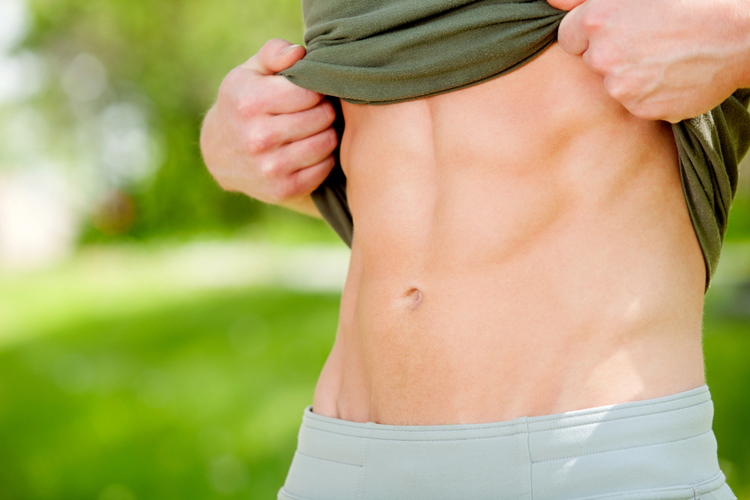Expert tips for building a six-pack
Expert tips to help you build and maintain a six-pack

The Bodybuilder
The theory
‘To maximise the growth potential of any muscle you need to target it directly with isolation work, then keep it under tension for between 40 and 70 seconds per set,’ says pro fitness model Shaun Stafford. ‘It is this time under tension that damages the muscle cells which then must be repaired and rebuilt so they come back stronger. This is the process that results in bigger, harder muscles.’
Get the benefit
‘When directly targeting the abs, slow each rep to increase the duration of the set to work the muscles thoroughly and add extra resistance to the moves, such as a holding a weight plate during crunches or a med ball between your feet during hanging leg raises. This way you are consistently asking your abs to work harder than they have before.’
The Powerlifter
The theory
‘Having a strong midsection is critical in powerlifting,’ says strength coach Phil Learney. ‘If you’re going to lift heavy, whether you’re bench pressing, squatting or deadlifting, you need a solid core to stabilise the spine. The deep abdominal muscles have to work hard to stop the spine from flexing. Lifting heavy also has a great muscle-building growth hormone pay-off.
Get the benefit
Get the Coach Newsletter
Sign up for workout ideas, training advice, reviews of the latest gear and more.
Use pull and push hip extension exercises to strengthen your abs muscles. Make the core work harder by following pulling exercises such as Romanian deadlifts with pushing moves such as good mornings. This changes the way weight is distributed across the abs and back, forcing you to keep your torso straight at all points of the lift.’
The Gymnast
The theory
Gymnasts are not only in incredible shape but they’re also seriously athletic. If you’ve ever tried to do the classic iron cross gymnastics move you’ll know it requires formidable strength as well as precise control and balance. ‘Your own bodyweight is the only tool you need to train like a gymnast,’ says Vince Walduck, director of BOA-accredited Heathrow Gymnastics Club (heathrowgymnastics.org.uk). Gymnasts use their body like a tensile whip so a lot of energy needs to be transferred through their core muscles.
Get the benefit
‘Abdominal exercises should involve folding or extending the body very dynamically,’ says Walduck. ‘In the most simplistic form this is replicated with hanging leg raises and back extensions. Completing these for static holds or with rotation or an added load makes these moves even tougher and your abs even stronger.’
The Fighter
The theory
Gone are the days when boxers chiselled out six-packs with hundreds of spine-wrecking crunches. For one thing, there are more effective moves. ‘Virtually every fighting move includes some degree of twisting or stabilisation,’ says coach Tom Davenport of Urban Kings gym. ‘So rotational exercises are key to generating power, and they’ll also hit muscle groups you won’t work with traditional abs moves.’
Get the benefit
Try the wall chop. Grab a medicine ball with rope attachment or hold one inside a towel. Stand with your back to the wall and swing from side to side, hitting the ball once to complete each rep.
The Strongman
The theory
Don’t be fooled by the barrel-like stomachs of top strongmen - underneath that protective fat is a phenomenal six-pack. The secret is overhead pressing. ‘Moves such as the giant log press require huge amounts of stability from your core,’ says strength and conditioning expert CJ Swaby. ‘Your obliques will get a workout just supporting the weight.’
Get the benefit
No strongman logs in your local gym? Do the push press instead. Doing a quarter-squat before overhead pressing will allow you to shift more weight than a traditional shoulder press, giving you a great workout.
Pilates
The theory
Some men can be sniffy about Pilates but they’re wrong to be. ‘Pilates helps to strengthen your core by activating core muscles and increasing the range of motion in your back,’ says Jason Reynolds from TenPilates. ‘It also helps you to keep your core active during exercises that use the larger muscle groups, which makes it highly functional.’
Get the benefit
‘Pilates exercises focus on both core strength and the activation of postural muscles around the pelvis and shoulder girdle,’ says Reynolds. To balance the direct abs work you do during the rest of your workouts, Reynolds suggests slow and controlled glute bridges, where you lie on your back with your knees bent and raise your pelvis. ‘This activates your glutes, reduces hip flexor tightness and allows you to stabilise through your abdominals.’
Coach is a health and fitness title. This byline is used for posting sponsored content, book extracts and the like. It is also used as a placeholder for articles published a long time ago when the original author is unclear. You can find out more about this publication and find the contact details of the editorial team on the About Us page.

